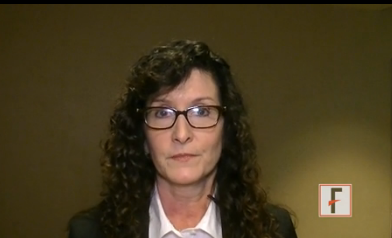User login
CHICAGO – The driving force behind anxiety is avoidance, according to Barbara Rothbaum, Ph.D., an expert in exposure therapy and a presenter at this year’s annual conference of the Anxiety and Depression Association of America.
"What we think maintains [a person’s] anxiety is avoidance of what they’re scared of," says Dr. Rothbaum in this video. "We help people confront what they’re scared of, in a therapeutic manner."
Particularly in posttraumatic stress disorder, there are two drivers holding anxiety in place, which when addressed by repeatedly immersing a patient in a virtual re-creation of the traumatic event, are relieved so the person can find peace. Many patients say, "It doesn’t haunt me anymore," according to Dr. Rothbaum, professor in the department of psychiatry and behavioral sciences and director of the trauma and anxiety recovery program at Emory University, Atlanta.
In this video, Dr. Rothbaum explores what drives anxiety and how the therapeutic, virtual re-creations of painful memories is helping patients with PTSD accept that although certain things will always be "sad," they need not negate joy and pleasure in life.
The video associated with this article is no longer available on this site. Please view all of our videos on the MDedge YouTube channel
On Twitter @whitneymcknight
CHICAGO – The driving force behind anxiety is avoidance, according to Barbara Rothbaum, Ph.D., an expert in exposure therapy and a presenter at this year’s annual conference of the Anxiety and Depression Association of America.
"What we think maintains [a person’s] anxiety is avoidance of what they’re scared of," says Dr. Rothbaum in this video. "We help people confront what they’re scared of, in a therapeutic manner."
Particularly in posttraumatic stress disorder, there are two drivers holding anxiety in place, which when addressed by repeatedly immersing a patient in a virtual re-creation of the traumatic event, are relieved so the person can find peace. Many patients say, "It doesn’t haunt me anymore," according to Dr. Rothbaum, professor in the department of psychiatry and behavioral sciences and director of the trauma and anxiety recovery program at Emory University, Atlanta.
In this video, Dr. Rothbaum explores what drives anxiety and how the therapeutic, virtual re-creations of painful memories is helping patients with PTSD accept that although certain things will always be "sad," they need not negate joy and pleasure in life.
The video associated with this article is no longer available on this site. Please view all of our videos on the MDedge YouTube channel
On Twitter @whitneymcknight
CHICAGO – The driving force behind anxiety is avoidance, according to Barbara Rothbaum, Ph.D., an expert in exposure therapy and a presenter at this year’s annual conference of the Anxiety and Depression Association of America.
"What we think maintains [a person’s] anxiety is avoidance of what they’re scared of," says Dr. Rothbaum in this video. "We help people confront what they’re scared of, in a therapeutic manner."
Particularly in posttraumatic stress disorder, there are two drivers holding anxiety in place, which when addressed by repeatedly immersing a patient in a virtual re-creation of the traumatic event, are relieved so the person can find peace. Many patients say, "It doesn’t haunt me anymore," according to Dr. Rothbaum, professor in the department of psychiatry and behavioral sciences and director of the trauma and anxiety recovery program at Emory University, Atlanta.
In this video, Dr. Rothbaum explores what drives anxiety and how the therapeutic, virtual re-creations of painful memories is helping patients with PTSD accept that although certain things will always be "sad," they need not negate joy and pleasure in life.
The video associated with this article is no longer available on this site. Please view all of our videos on the MDedge YouTube channel
On Twitter @whitneymcknight
EXPERT ANALYSIS FROM THE AADA ANNUAL CONFERENCE
